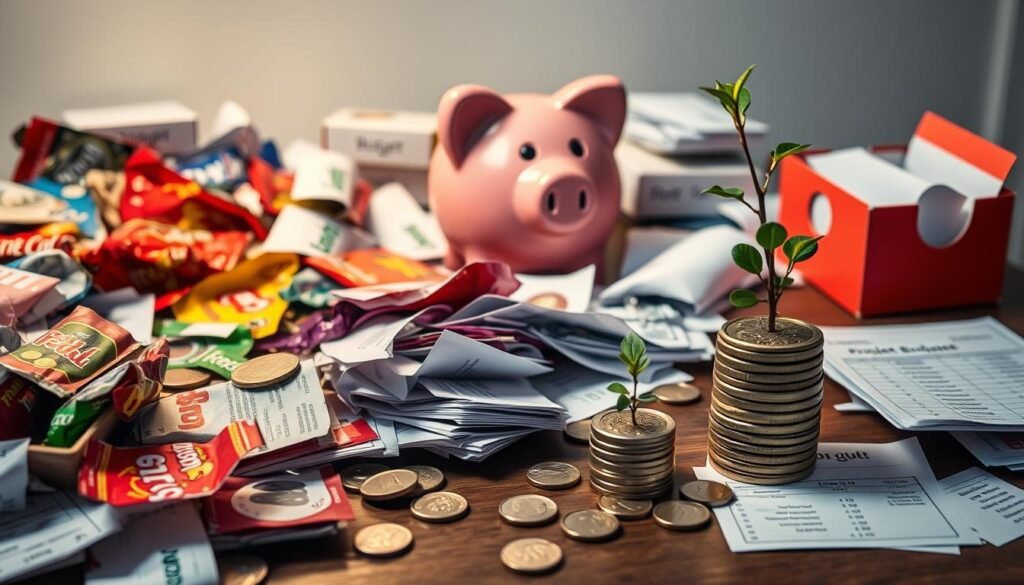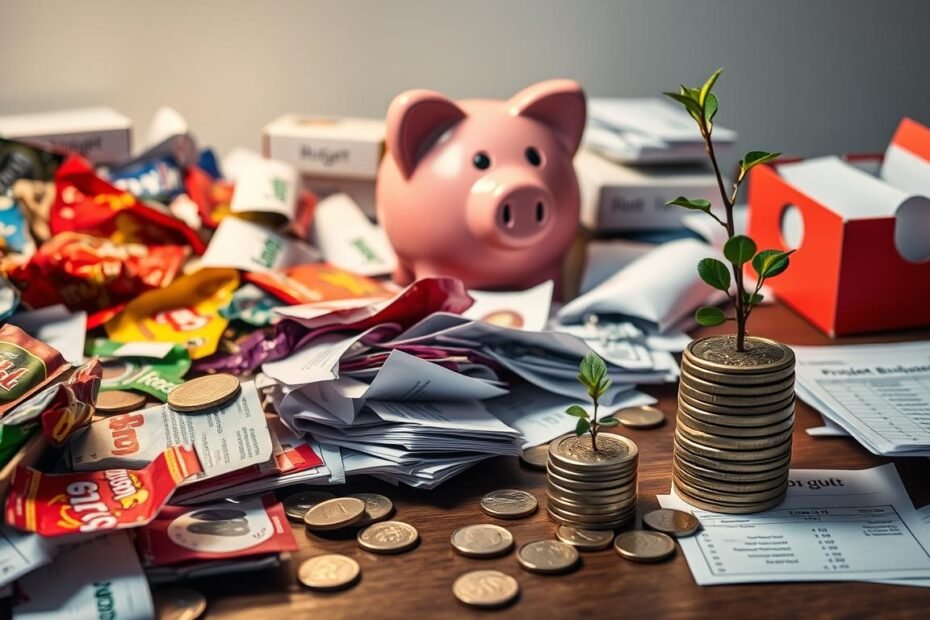Could your daily habits be silently sabotaging your wealth—and how can you break free before it’s too late?
Do your daily money habits secretly hold you back from getting rich? It’s a surprising fact, but many of us do things that hurt our financial future without knowing it. Not saving enough and getting caught up in spending more are just a couple of examples. These habits can really affect our ability to grow wealth over time.
In this article, we’ll look at 10 common money mistakes and how to overcome them. By understanding why we do these things and the psychology behind them, you’ll get the tools to take back control of your money. Start your journey to financial freedom and learn how to build wealth, one habit at a time.

Key Takeaways
– Recognize the impact of common bad financial habits on long-term wealth building
– Understand the psychology behind poor money management behaviors
– Learn effective strategies to break free from destructive financial patterns
– Develop new, healthy financial routines to support your wealth-building goals
– Unlock the power of mindset and habit change to achieve financial success
Understanding the Psychology Behind Poor Financial Habits
Our thoughts about money deeply influence our financial habits. These habits can either help us grow wealth or keep us stuck in financial trouble. Charles Chaffin from the Financial Psychology Institute says we often stick to what we know because our brains are wired that way. This makes changing our financial habits hard, especially when we’ve been doing things a certain way for 100,000 years.
Impact of Financial Mindset on Wealth Building
Our beliefs and attitudes towards money are key to building wealth. Chaffin suggests making it easy to do the right thing with money and hard to do the wrong thing. For example, setting up automatic transfers to savings or investments can help you save and invest more.
Common Psychological Barriers to Financial Success
Many psychological barriers can stop us from achieving financial success. Simple steps like not saving credit card info online can help avoid overspending. Using cash instead of digital payments makes spending feel more real and helps us stay on track. Setting clear financial goals also boosts our chances of sticking to good habits.
Breaking Mental Money Blocks
To overcome bad financial habits, we must face our mental blocks. Chaffin advises regularly checking our finances to spot what’s working and what’s not. Avoiding this can lead to serious money problems. Just as good habits improve our health, a positive money mindset can help us overcome financial hurdles and build wealth.
10 Habits Keeping You Poor: Shocking Examples and How to Break Free
Breaking the cycle of poverty starts with spotting and fixing our bad financial habits. These habits can quietly hold us back, keeping us in a cycle of struggle. But, by recognizing these patterns and using effective strategies, we can break free and move towards a better future.
Living paycheck to paycheck is a silent wealth killer. It traps people in a cycle of financial instability. This issue affects millions of Americans, many unaware of its impact on their finances.
Living paycheck to paycheck is a financial situation where a person relies entirely on their next paycheck to cover essential expenses, with little to no savings or financial cushion. In this state, missing one paycheck could lead to financial distress, such as unpaid bills, accumulating debt, or inability to afford basic needs. This cycle leaves little room for savings. People are left vulnerable to unexpected expenses or emergencies. Without a financial cushion, it’s hard to break free and build a secure future.
Impulsive Spending is all about Making unplanned purchases without thinking about the long-term effects. For example, Sarah loves to buy the latest gadgets, shoes, or sale items, even if she doesn’t need them. When the month ends, she’s shocked by her credit card bill. She then finds it hard to pay off her debts.
Impulse buying and emotional spending can harm our finances. Americans spend about $150 monthly on impulse, adding up to $1,800 a year. Over a lifetime, this totals around $108,000. A study by Ramsey Solutions shows 48% of Americans find it hard to resist these purchases, often buying clothes, home goods, and food.
Credit Card Debt and High-Interest Traps. Credit card debt happens when you don’t pay off your credit card balance by the due date. This leads to interest charges, which can be very high. These high-interest rates make it hard to pay off the original debt, trapping you in a cycle of payments.
Many people struggle with credit card debt and high-interest rates. The average interest rate in the U.S. is about 22%. This can quickly eat away at any savings if not handled carefully.
Carrying a balance on credit cards can lead to a snowball effect. For instance, a $5,000 balance with an 18% interest rate can take over 20 years to clear. With just $100 monthly payments, the total interest paid would be nearly $11,000.
Living Beyond Your Means. It involves spending more than you earn, often through credit or loans.
Example, John makes $3,000 a month but spends $3,500 on a fancy car, designer clothes, and eating out. This leaves him with no money for savings or investments. He ends up with debt and high-interest rates.
Lack of Budgeting is failing to track income and expenses, leading to financial chaos.
Example: Maria makes $2,500 a month but doesn’t plan her spending. She runs out of money halfway through the month. To pay for groceries and bills, she uses a credit card, which adds to her debt.
Avoiding Investments by Keeping all your money in cash or low-interest accounts instead of investing in assets that grow over time.
Example: Alex saves $10,000 in a standard savings account earning 0.5% interest, while his friend Lisa invests $10,000 in an index fund with an average 7% annual return. After 10 years, Lisa’s investment is worth significantly more, while Alex’s barely grows.
Relying on a Single Income Source. Depending entirely on one job or income stream without diversifying.
Example: Mark relies solely on his $2,000 monthly salary. When he loses his job unexpectedly, he has no backup plan and struggles to cover his expenses.
Ignoring Emergency Funds. Failing to save for unexpected expenses like medical bills, car repairs, or job loss.
Example: Anna has no savings. When her car breaks down, she takes out a payday loan with a high interest rate, worsening her financial situation.
Not Setting Financial Goals. Living without clear objectives for savings, debt reduction, or wealth-building.
Example: Kim earns a good income but spends aimlessly because she has no savings goals or investment plans. Years later, she wonders where all her money went.
Lifestyle Inflation on Wealth Building. Lifestyle inflation, also known as lifestyle creep, happens when someone spends more as they earn more. They might buy nicer things or travel more, but they don’t save or invest the extra money. This habit stops them from building wealth because they use the extra cash on things they don’t really need.
Example: Imagine someone making $3,000 a month and saving $300 (10%). They get a raise to $4,000 a month. But then, they spend $1,000 more on a fancy car lease and eating out.
Even with the raise, their savings rate doesn’t change or might even go down. This shows how important it is to keep saving, even when we make more money.
Strategies for Breaking Free from Poor Money Habits
To overcome bad money habits, we need a detailed plan. Understanding our psychological barriers to success is key. This might mean dealing with low self-worth, fear of success, or a mindset that believes there’s never enough.
Practical steps like making a budget, automating savings, and learning about money are also crucial. By controlling our spending, focusing on long-term goals, and building a healthy money relationship, we can grow our finances sustainably.
Creating New Financial Routines
The path to breaking the poverty cycle is through new, positive financial habits. This means setting savings goals, automating payments, and regularly checking our spending and investments. By making these habits a regular part of our lives, we can replace old, harmful patterns.
Change takes time, but with dedication and a focus on personal growth, we can overcome financial barriers. By adopting a wealth mindset and taking deliberate steps towards financial freedom, we open doors to new possibilities and create the life we want.
Conclusion
In this article, we’ve looked at the top ten habits that can make you financially poor. We’ve talked about how these habits can block your way to wealth. It’s important to understand and overcome these habits to move forward.
Living paycheck-to-paycheck, using credit cards too much, and not saving for emergencies can trap you. But, by changing your mindset and budgeting wisely, you can achieve financial freedom. This freedom comes from smart investments and personal growth.
Your financial habits are crucial for your future success. By changing bad habits to good ones, you can improve your money relationship. Start this journey to financial empowerment and break free from habits that hold you back. Best wishes on your journey to financial freedom and wealth.

